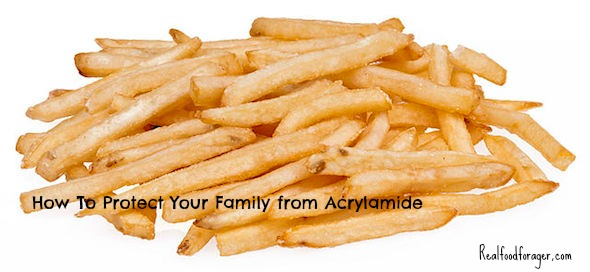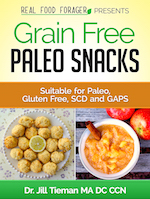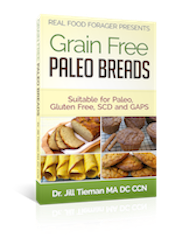Following a grain-free and moderately low carb diet, the starchiest vegetable I eat is usually winter squash. However, I do splurge on occasion and eat potatoes and even make my own homemade fried potatoes or vege chips (in tallow). I have been concerned with the acrylamide issue and thought I would research it. The chemical acrylamide, is formed when potatoes are cooked and it has been shown to be carcinogenic. I was surprised to find a simple fix.
Acrylamide
Acrylamide is a chemical that is formed in starchy plant foods like potatoes when they are heated to temperatures above 248 degrees Farenheit. It was first discovered to be present in food by the Swedish National Food Authority in 2002 and this information hit the media with a storm of concern. The concern was based on acrylamide’s classification by the International Agency for Research on Cancer as a class 2A “probable human carcinogen”.
There was concern in the public sector and a subsequent decrease in sales of potato chips in the months immediately following the publication of the association with cancer.
Acrylamide is found in 40 percent of the calories consumed in the average American diet. The highest levels are found in baked and fried potatoes like french fries and potato chips, but it is also detected in diverse foods such as breads, cereals, cakes, coffee and cocoa.
For those health driven folks on a real food diet this is an issue. We may not eat packaged foods, but certainly many real foodies eat potatoes and bread and drink coffee. There is science behind the very real concern with acrylamide and there are steps you can take at home to minimize the risk.
The Mechanism
Acrylamide is not a food contaminant. It forms as a by-product of cooking specific foods at high temperatures through a Maillard reaction between amino acids, primarily asparagine, and reducing sugars such as fructose or glucose.
The Science
Most of the studies I read, measured acrylamide by measuring the acrylamide hemoglobin and glycidamide hemoglobin levels in the bloodstream. These two substances are the metabolites that are formed after consumption of acrylamide in food.
A study published in the journal Toxicology in 2012 concluded that … “pre-diagnostic exposure to acrylamide may be related to mortality among breast cancer patients and that this may especially concern the most endocrine related type of breast cancer such as estrogen receptor positive tumors.”
In a prospective cohort study published in Cancer Epidemiology, Biomarkers & Prevention in 2010, the investigators studied the effects of acrylamide consumption and risk for breast, endometrial, and ovarian cancers.
They concluded that there was no association between acrylamide and breast cancer, but the risk for endometrial cancer and possibly ovarian cancer was greater among high acrylamide consumers.
Another study published in the Journal of Clinical Nutrition in 2009 indicates that chronic intake of potato chips in humans increases the production of reactive oxygen radicals by leukocytes and increases plasma C-reactive protein. The researchers concluded that… “These novel findings seem to indicate that chronic ingestion of acrylamide-containing products induces a proinflammatory state, a risk factor for progression of atherosclerosis.”
This is a small pilot study that involved 14 healthy volunteers (mean age: 35 y; 8 women and 6 smokers of >20 cigarettes/d) who were given 160 g of potato chips containing 157 microg of acrylamide daily for 4 weeks. They found an increase in acrylamide-hemoglobin adducts in blood in all the study subjects, as well as significant increase in the oxidized LDL, high-sensitivity interleukin-6, high-sensitivity C-reactive protein, and gamma-glutamyltransferase concentrations was observed in both smokers and nonsmokers.
These markers indicate inflammation and we know that inflammation is at the basis of many health problems.
There are a few other studies that show no association between cancer and acrylamide and you can find them discussed here.
The UK Survey
In an ongoing survey of processing contaminants in fast food, restaurant food and store-bought food, the UK’s Food Standards Agency survey uncovered various levels of acrylamide. Researchers tested nearly 200 samples. Acrylamide was found in both conventional and organic products with Pringles potato chips having four times the amount found in McDonald’s french fries.
In spite of the fact that some studies show no association between acrylamide and cancer, I would err on the side of caution and consider the studies that do show the association as information to consider when making food choices.
The Solution
According to Rodale news, soaking raw, sliced potatoes in water for 2 hours before frying reduces acrylamide by nearly 50%. They suggest that even a 30-second rinse reduces it by more than 20%.
The Best Solution
This somewhat obscure study published in Food Chemistry and Toxicology in 2006 found that lactic acid fermentation reduced acrylamide formation and other Maillard reactions in french fries. This was very interesting and the first time I have heard of fermenting potato before cooking.
The researchers found that lactic acid fermentation of nonblanched potato rods for 45 min reduced acrylamide levels in french fries 48% after 45 minutes and 71% after 2 hours. Blanching the potato rods and then fermenting them, reduced the acrylamide levels by 79% after 45 minutes and by 94% after 2 hours. They found that blanching and especially lactic acid fermentation reduced the browning of the french fries visually.
Importantly, the lower levels of acrylamide are due to decreased levels of reducing sugars rather than reduction of available asparagine, an amino acid.
Lactic acid fermentation is a traditional way to preserve foods, make food more digestible, increase nutrient value, add probiotics to the food and in general, fermented foods are a fantastic addition to a healthy diet. See more about fermented foods here.
Since I am already used to soaking nuts and seeds (and I would certainly soak grains if I ate them), it is easy to remember to soak the potatoes in some water with a little salt and starter culture for 2 hours before cooking. I pat them dry with a paper towel and cook as usual. This is an easy fix for a potential health hazard.
Do you soak your spuds? Have you ever fermented potatoes? Leave a comment a let me know!
Where to get vegetable starter culture
Here is a great book on fermentation
Photo Credit
Shared at: Real Food Wednesday, Allergy Free Wednesday, Thank Your Body Thursday, FIght Back Friday













